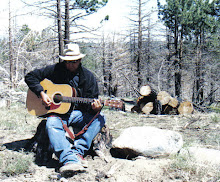
In May of 1956, New Jersey cops busted a wiry little man for vagrancy. He was headed West out of New York City, on a Greyhound, and he didn’t have any money for the fare. He told the cops he was sick, and not drunk, and requested to be taken to a hospital. The psychiatrist who examined him thought he was delusional because he claimed to have written a thousand songs, a novel, and to have recorded for the Smithsonian. He was Woody Guthrie, the man Allen Lomax had called, “America’s greatest ballad writer,” and he was on his last downhill slide. He would live for another eleven years, but his ramblin’ days were over, cut short by a rare neurological disease that he had inherited from his mother, who used to sing him to sleep with traditional American folk songs.
By the time Woody passed away a cultural phenomenon called the Folk Revival had hit, and the folks who had known him the best, and been touched by him the deepest, were hard at work turning him into an American legend. Allen Lomax and Irwin Silber were turning out songbooks top heavy with Guthrie compositions, Pete Seeger was travelling the country singing his songs and telling stories about him, Ramblin’ Jack Elliott was recording whole albums of his songs, and his wife, Marjorie, had established a foundation to secure his legacy for his children. Bob Dylan had already emerged on the scene, visited Woody in the hospital, and was singing his songs, and his praises, to anyone who would listen. Dylan played his first big gig at Gerde’s Folk City wearing one of Woody’s old suits and recorded Song To Woody for his first album.
The Folk Revival didn’t last long, but the spirit of Woody Guthrie was at the heart and soul of it from the beginning. Woody Guthrie showed you that there was something more to folk music than just playing Sally Goodin. With three chords and a borrowed tune you could make up your own song. You could write about what you saw around you, you could write about your own life, you could comment on what was happening in the news, you could tell a story that could break someone’s heart, and maybe you could change the world. Young songwriters, stoked on Woody Guthrie’s legend, became influential in all fields of music, folk, country, blues, rock, pop, rap and punk. It’s not hard to call Woody Guthrie the world’s most influential songwriter. What’s hard is to try to find a serious songwriter anywhere that does not cite Woody as a primary influence.
The influence of Woody Guthrie on modern music endures because of the content and quality of the songs themselves. Although most of his best songs were written in the depression era, they remain relevant to each generation because of their humanity. Woody’s songs celebrate the dignity of the working class while shining a light on the greed and hypocrisy of the rich. In Woody’s songs, the outlaws are always good guys and the bankers, cops, lawyers, politicians and preachers are the bad guys. His songs say to the overworked, dispossessed, abused and downtrodden, “You’re not alone, you didn’t do anything wrong, you don’t deserve to be treated this way, and you don’t have to take it.” He wrote most of his songs to traditional tunes that the common people already knew, giving them the almost biblical power of folk music, a power that still resonates with people today, even if they can’t name the tune.
Woody’s legend will endure, and his songs will continue to be influential as long as there is injustice in the world and as long as people have the will and the spirit to stand up to it. As long as young people have the idealism to see what’s wrong in their world and to imagine that they could set things right with a couple of chords and the fire in their soul, they will find Woody’s music and be inspired by it. Woody’s guitar said ”This Machine Kills Fascists,” and that’s what it was all about, a young man headed West with a notebook full of rhymes, a heart full of songs, and a lonesome whistle blowin’ in the distance…
Archie Logsdon

No comments:
Post a Comment